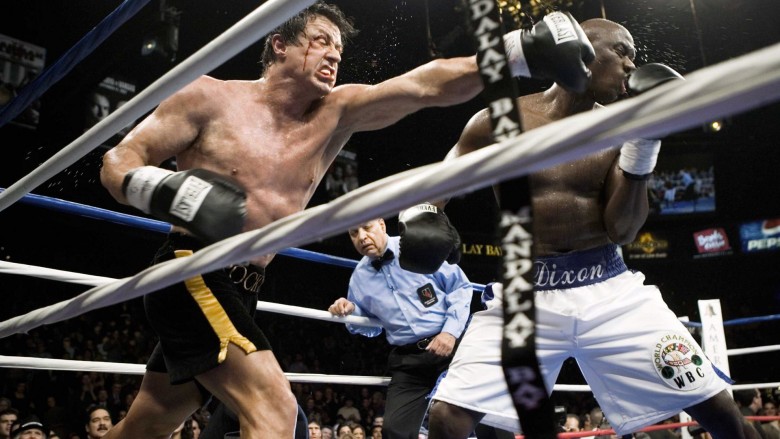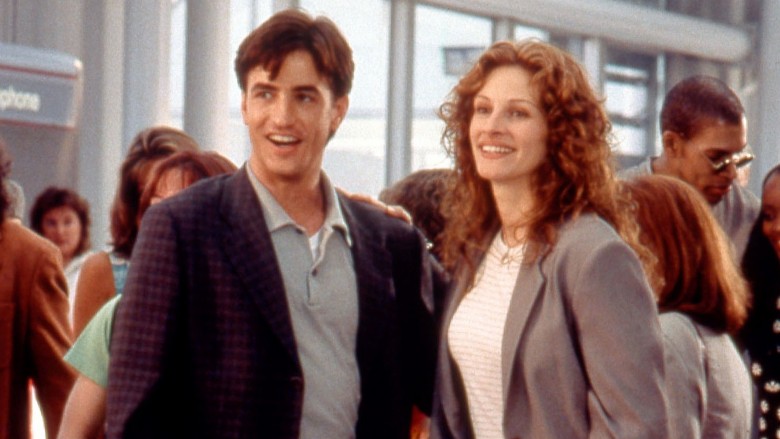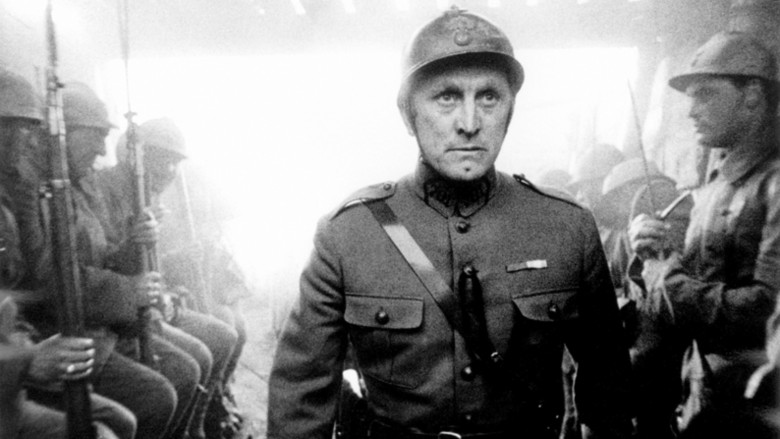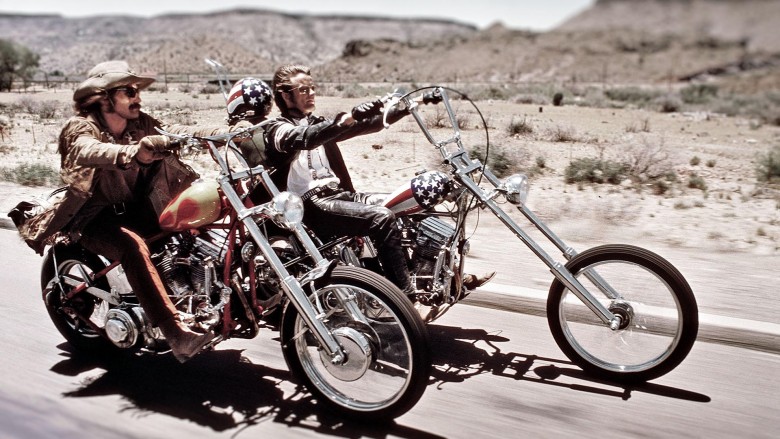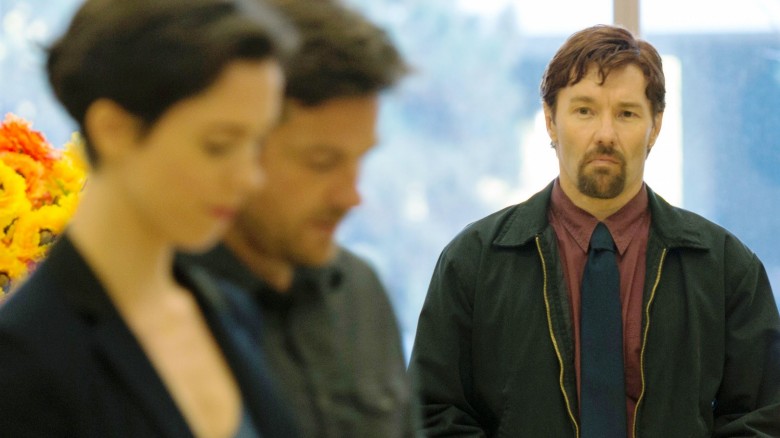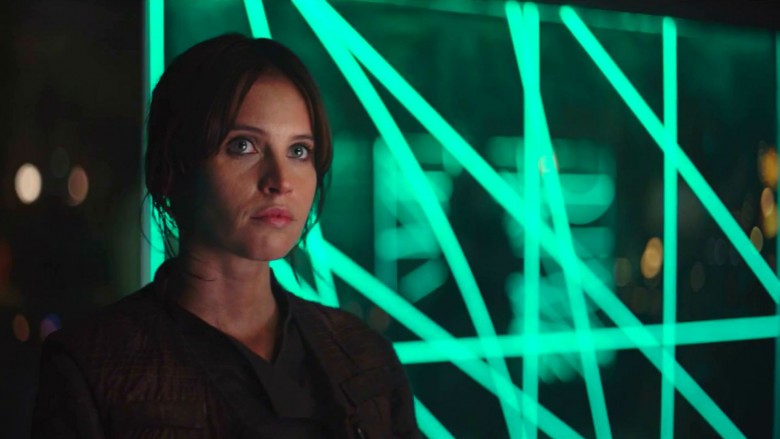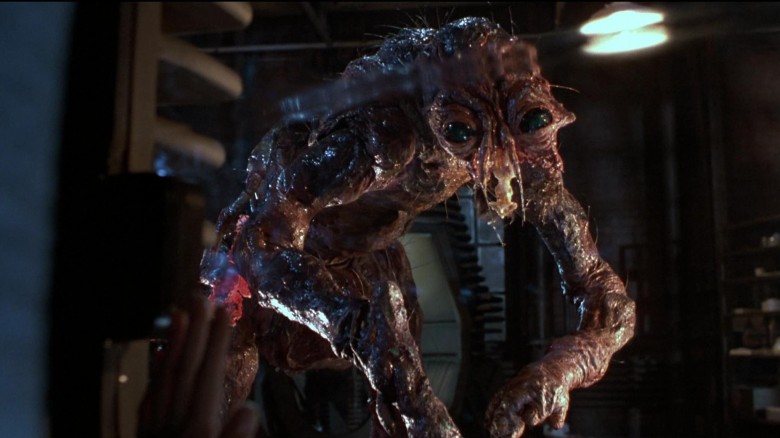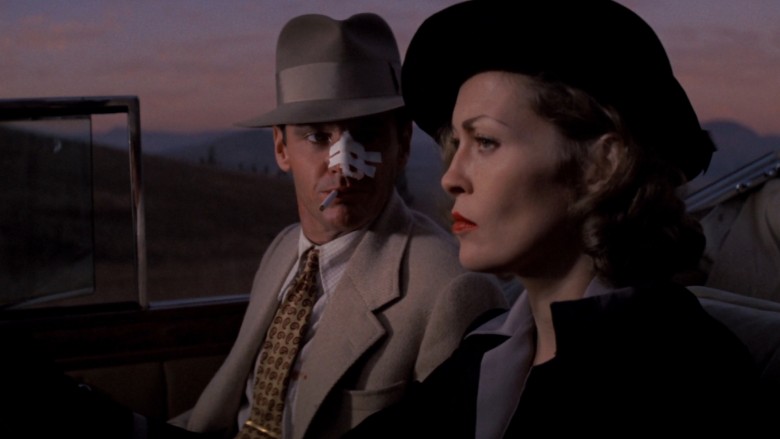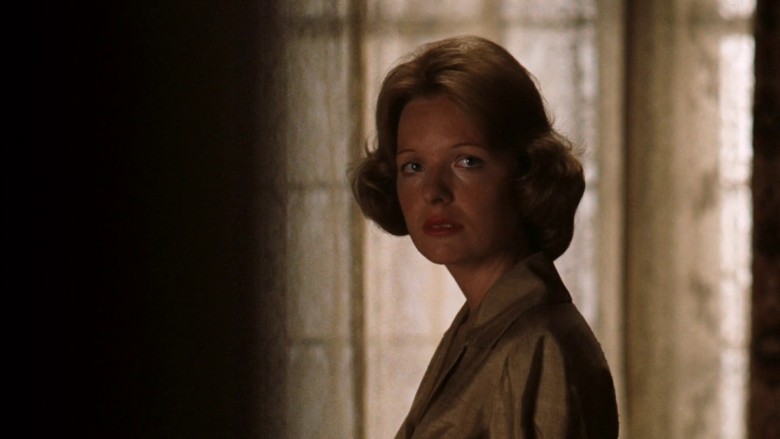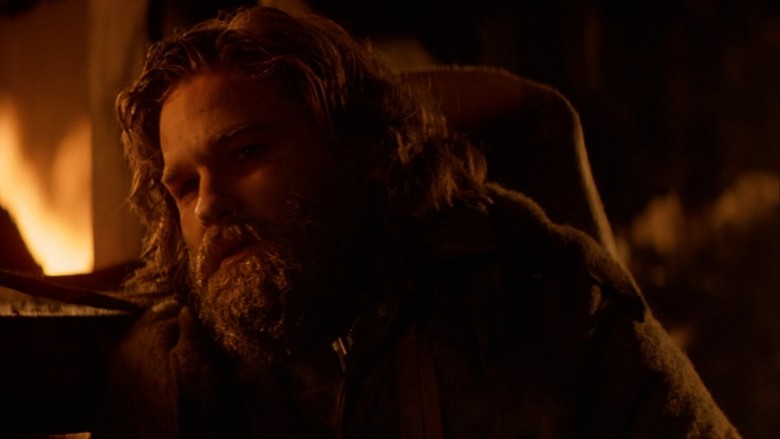Movies That Almost Had Much Happier Endings
Yeah, it's nice when everybody gets to live happily ever after, but not every movie should end with our heroes smiling. Sometimes, the star-crossed couple needs to break up, the revolutionary hero should give her life for the cause, and the monster ought to eat the main character.
Of course, ending a film on a depressing note can be a pretty risky move, and over the years, a lot of nervous filmmakers have considered closing the show with a load of laughs, only to change their minds and go dark instead. From anti-war dramas to Mafia epics, here are a few movies that almost had much happier endings.
Rocky Balboa (2006)
Whether he wins by knockout or loses by split decision, Rocky Balboa always walks away from the ring with a smile on his face. (Okay, okay, not counting his first fight with Clubber Lang.) After all, Balboa isn't obsessed with getting the win. Sure, it's nice to get your hands raised in the air, but for the Italian Stallion, it's more about going toe-to-toe with whatever life throws at you. Or as the man puts it himself, "It ain't about how hard you hit. It's about how hard you can get hit and keep moving forward."
So when the boxer finally pulls on a pair of gloves at the end of Rocky Balboa, we know that win, lose, or draw, he'll come away with a moral victory. Audiences everywhere were hoping Rocky would defeat the heavyweight champ, Mason "The Line" Dixon, but similar to the ending of the first Rocky film, Balboa loses a split decision, although he wins the love of everyone watching the fight.
However, there's an alternate ending in which the brawler bests Dixon, walking away with a razor-thin decision. After reading from the judges' scorecards, the announcer declares Rocky "Philadelphia's undisputed heavyweight champion," and the Italian Stallion celebrates his final victory with friends and family. Naturally, Dixon isn't thrilled with the result, but he does admit in a post-fight interview, "One thing I know, you gotta respect your elders if they hit like that."
My Best Friend's Wedding (1997)
Julia Roberts was the queen of the '90s box office, absolutely killing it with films like Pretty Woman, Runaway Bride, and Notting Hill. Her 1997 rom-com My Best Friend's Wedding was certainly no exception, raking in $127 million and earning positive reviews from critics. Directed by P.J. Hogan, the movie follows Roberts' character trying to win the affection of her best friend (Dermot Mulroney) who's about to get hitched to Cameron Diaz. After a series of mishaps and hijinks, Roberts eventually loses the war for Mulroney's heart and spends the last moments of the movie dancing with her close friend (played by Rupert Everett).
It's a bittersweet scene, one that wouldn't have made it to theaters without the help of test audiences. In the original ending, Mulroney and Diaz still tie the knot, but Roberts finds a potential new boyfriend and spends the last few seconds dancing with her newfound Romeo. But at test screenings, moviegoers were totally baffled, filling out cards that read, "Who is the guy that she's dancing with at the end? What's she doing with him?" These preview audiences were also really fond of Rupert Everett's character, so Hogan and screenwriter Ron Bass decided to kill two birds with one stone, giving the Brit a bigger part and adding him into the finale, crafting a nice little scene that's sure to pull at your heartstrings.
Paths of Glory (1957)
While not as famous as his later classics—Dr. Strangelove, The Shining, and A Clockwork Orange—Paths of Glory is widely considered one of Stanley Kubrick's best films. Roger Ebert added the picture to his "Great Movies" collection, and David Simon (showrunner of The Wire) hailed Paths of Glory as "the most important political film of the 20th century." But while it's garnered praise from some of the biggest names in show business, the film has drawn quite a bit of criticism over the years—especially in France, where it was essentially banned for nearly 20 years. The film was also censored in countries like Spain and Switzerland, so what prompted such a backlash?
Well, Paths of Glory is one of the most powerful anti-war films ever made. The story focuses on a World War I battle in which an ambitious French general (George Macready) orders his men to take a heavily fortified German position. But before they can reach the enemy, the troops must cross a murderous no man's land, and understandably, many refuse to follow the general's command. Infuriated, the officer picks three random soldiers to stand trial for cowardice, and despite a brave colonel's (Kirk Douglas) best attempts, the men are sentenced to death and executed.
It's a devastating ending, and one you couldn't find in Jim Thompson's original screenplay. With Kubrick's encouragement, Thompson actually wrote a finale in which Douglas manages to free the three prisoners...but the A-list actor wasn't having it. According to Douglas, he confronted Kubrick after reading the script, asking, "Stanley, did you write this?" When the director said yes, Douglas replied, "Stanley, why would you do that?" Douglas knew if Paths of Glory was going to drive its point home, the soldiers had to die. And since this was before Kubrick had morphed into an auteur's auteur, the director allegedly acquiesced to Douglas's demands, giving us a conclusion that Ebert compared to the twist of a knife.
Easy Rider (1969)
A touchstone film for the 1960s counterculture, Easy Rider helped launch Jack Nicholson's career and played a key part in bringing about the New Hollywood era. It also guaranteed people would have "Born to be Wild" stuck in their heads for years to come. But while this seminal biker flick follows a bunch of laid back hippies, things take an incredibly violent turn near the end, when Wyatt (Peter Fonda) and Billy (Dennis Hopper) are attacked by shotgun-toting rednecks. Right before the credits roll, we see the bikers lying dead on the road, with Wyatt's motorcycle in flames.
So who decided to end the film on such a dark note? Well, that depends who you ask; there's actually a bit of debate about who really wrote Easy Rider. According to Peter Biskind's book Easy Riders, Raging Bulls, Hopper and Fonda said they were the ones responsible for the script. However, novelist Terry Southern—who also worked on Dr. Strangelove and Barbarella—claims he's the one responsible for the screenplay, going so far as to say that, "Neither [Hopper or Fonda] are writers. They can't even write a f—ing letter."
If you believe Southern (who Hopper says only came up with the title), he was the one who decided to kill Billy and Wyatt. And according to the screenwriter, Hopper was shocked at his suggestion, saying, "You mean kill 'em both? Hey, man, are you outta your gourd?" It seems Hopper was hoping the bikers would successfully stick it to the man, but Southern wanted to write "an indictment of blue-collar America, the people [he] thought were responsible for the Vietnam War." So if you want to stick it to the squares, the hippies have to bite the bullet. Fortunately, Southern quickly convinced Hopper this was the only way to go, saying the actor "was hip enough to realize...that [their death] was more or less mandatory."
The Gift (2015)
Directed by Joel Edgerton, The Gift is a creepy little thriller with a rather controversial ending. The film revolves around Simon and Robyn Callem (Jason Bateman and Rebecca Hall, respectively), a married couple that runs into an unsettling weirdo named Gordo (Edgerton). Simon and Gordo were high school classmates, but they're not exactly chums. It quickly becomes apparent that Gordo has it out for his old buddy, and while we're tempted to feel sorry for Simon, we quickly realize he's a bully who played a key part in destroying Gordo's life.
Of course, our sympathetic feelings for Gordo don't last long, as things take an icky turn when he finally enacts his vengeful vendetta. After a number of plot twists, Simon's world is turned upside down when he discovers a DVD on his front porch. When he pops the disc into the DVD player, Simon is horrified by footage of a masked Gordo drugging Robyn and preparing to rape her (although Gordo shuts off his camera before carrying out his attack). Suddenly, Simon isn't sure if his newborn son is actually his own flesh and blood, allowing the film to end on uncomfortably ambiguous note.
However, there's actually an alternate ending that clears up a bit of the mystery. Talking to CinemaBlend, Edgerton revealed he shot a scene where we see a flashback to the assault, and it's revealed that Gordo never carried out his perverted plan. But at the end of the day, the director decided to keep things mysterious, leaving both Simon and moviegoers to wonder if Robyn was actually assaulted.
Rogue One: A Star Wars Story (2016)
For a series that loves its sequels and reboots, Star Wars certainly isn't scared of killing its main characters. Obi-Wan bit the dust in A New Hope, Yoda kicked the bucket in Return of the Jedi, and Harrison Ford finally got his Han Solo death wish in The Force Awakens. But when it comes to picking off protagonists, Rogue One totally takes the title for the most murderous Star Wars movie.
In a valiant effort to steal the Death Star plans, Jyn Erso (Felicity Jones) and her ragtag band invade the planet Scarif, and while they manage to transmit the data to a nearby Rebel ship, our heroes are killed one by one, a la The Dirty Dozen. Finally, we watch as the two remaining survivors, Jyn and Cassian Andor (Diego Luna), share their last moments on a beach, embracing as the Death Star obliterates the planet.
It's a pretty grim ending for a Star Wars movie, but in one of the early drafts of the Rogue One screenplay, Jynn and her friends actually made it off Scarif alive. As director Gareth Edwards explained to the Empire podcast, "It was just assumed by us that we couldn't [kill the cast], and they're not gonna let us do that." However, Edwards quickly got permission from producer Kathleen Kennedy to turn the heroes into bantha poodoo.
As you might expect, the director was shocked, saying he "kept waiting for someone to go, 'You know what? Could we just film an extra scene where we see Jyn and Cassian, they're okay and they're on another planet?" But that order never came, dooming Jyn to a fiery finale, one that probably prompted quite a few sniffles in theaters across the galaxy.
The Fly (1986)
Released in 1986, David Cronenberg's The Fly stars Jeff Goldblum as the unfortunate Seth Brundle, a brilliant scientist who accidentally merges with—you guessed it—a fly. After this experiment-gone-wrong, Brundle begins acting erratically, losing body parts, and finding new ways to eat his meals. But while Brundle is in deep trouble, it's Veronica Quaife who needs to be very afraid.
Played by Geena Davis, Veronica is a journalist who's fallen hard for the bug-eyed inventor. In fact, she's pregnant with his child. Of course, this is less-than-joyous news, as she realizes her kid is probably part insect. As a result, Veronica worries her child will resemble its dear old dad, so she decides to undergo an abortion. However, Brundle quickly kidnaps his old flame with the intent of fusing himself to Veronica and her fetus. But after a grisly showdown, the inventor dies when his girlfriend finally puts him out of his misery.
It's a gut-punch of an ending, especially as the film cuts to black with Veronica crying her eyes out. However, Cronenberg actually considered going with several other endings that would've left audiences feeling a little less icky. For example, the director shot a scene where Veronica is in bed with her ex-lover, Stathis Borans (John Getz), who implies she's no longer pregnant with Brundle's baby. Instead, she's now carrying Stathis's child. Not worried anymore about giving birth to a maggot monster, Veronica drifts off to sleep and dreams that her future child will hatch from a chrysalis and fly away with butterfly wings.
Sure, it's sweet...and that's the problem. Cronenberg realized that after Veronica's gruesome showdown with the Brundlefly, audiences weren't going to buy an uplifting ending. After all, they'd just had their hearts ripped out of their chests and locked away in glass jars. People were going to be too devastated by all the carnage and misery, and this cheery ending simply wasn't going to, ahem, fly.
Chinatown (1974)
Directed by Roman Polanski, Chinatown might take the cake for darkest movie ending of the 1970s, which is really saying something. This neo-noir follows the investigations of Jack Gittes (Jack Nicholson), a private eye who's sucked deep into the corrupt world of L.A. politics. Working for a mysterious woman named Evelyn Mulwray (Faye Dunaway), Gittes stumbles across a murder, has his nose sliced with a knife, and discovers a scheme involving the city's water supply. Worse still, he learns that Evelyn was raped by her father, Noah Cross (John Huston), an incredibly powerful businessman. In fact, he's the father-grandfather of Evelyn's daughter.
Yeah, it's pretty grim stuff, all capped off by a showdown in Chinatown where Evelyn is killed by Cross's henchman, and the pervy old man captures his daughter-granddaughter, dragging her off to a horrible fate. After all the mayhem is over, Gittes stands in the middle of the street, defeated, as a colleague tells him, "Forget it, Jake. It's Chinatown." It's a classic line for a classic ending, and one that wasn't in Robert Towne's original screenplay. In fact, the legendary writer actually intended for our heroes to emerge victorious. His plan was to have Gittes and Mulwray murder Cross, allowing Evelyn and her daughter to finally escape his incestuous grasp.
But Polanski wasn't convinced. Since filming took place just a few years after the murder of his wife, Sharon Tate, it's safe to assume the director was in a pretty dark place. As a result, Polanski wanted an ending where evil triumphs over good. Towne was initially reluctant, saying this new climax was "so melodramatic," but over time, he's come over to the director's side, agreeing that, "Roman was right. A story with that degree of complexity needed the clarity and simplicity of the ending that he saw."
The Godfather (1972)
It's one of the most violent endings ever filmed, and it doesn't involve a single drop of blood. After rising to the top of the Mafia mountain, Michael Corleone (Al Pacino) has truly lost his way, going so far as to murder his own brother-in-law. And when he's confronted by his wife, Kay (Diane Keaton), the new godfather denies doing the deed, lying straight to her face and cementing his status as the world's worst husband. But that's nothing compared to what happens next. After Kay leaves the room, she turns to see Michael's henchman paying homage to their new don...and that's when the door slams right in her face, damning the Corleone family to a lifetime of pain and suffering.
Really, it's one of the best conclusions ever put to celluloid, but believe it or not, director Francis Ford Coppola actually shot an alternate ending. And while it isn't exactly upbeat, it's far less cold than Michael cutting off his wife. In this deleted scene, we see Kay visiting a church and lighting candles for Michael's soul, hoping there might be a chance her husband can be redeemed. (Spoilers: There isn't.) But even though the ending was closer to Mario Puzo's novel, Coppola realized it was "anti-climactical [sic]" and decided to leave the ending and take the cannoli.
The Thing (1982)
If you like your endings cold, bleak, and nihilistic, then John Carpenter's The Thing is the movie for you. When a shape-shifting alien attacks an Antarctic research station, the all-male crew must band together to fight this otherworldly foe. Of course, when your enemy can take the form of anyone or anything, it's kind of hard to trust your own buddies. Who's human, and who's a thing?
That's the ultimate question posed by the film's finale. After all his friends are killed off by the alien, helicopter pilot MacReady (Kurt Russell) goes mano a mano with the monster, sending the creature to kingdom come with a whole bunch of dynamite. But his victory is short-lived, as the base has lost all power, and chances are pretty good he's going to freeze to death. However, MacReady quickly discovers he isn't the only survivor. His arch-rival Childs (Keith David) has also escaped the monster's grasp...but our hero isn't ready to celebrate just yet.
You see, MacReady doesn't really know if Childs is actually Childs, or if he's a body-morphing alien getting ready to pounce. (For that matter, we don't even know for sure if MacReady is actually human at this point.) Both men are incredibly suspicious of each other, and the film ends with the two sitting in the burning ruins of the camp, sharing a bottle of whiskey, freezing to death, and waiting to see who's really who. Talk about a downer.
In fact, editor Todd Ramsay was so worried about the ending that he persuaded Carpenter to film a backup, just in case they had to make a change later on. According to Ramsay, they actually shot an ending where MacReady is rescued, taken back to civilization, and definitively proven to be human. Fortunately, Carpenter had the good sense to set this ending ablaze with a flamethrower, and while The Thing didn't fare well back in 1982, it's now recognized as a classic, largely thanks to its ultra-ambiguous ending.

